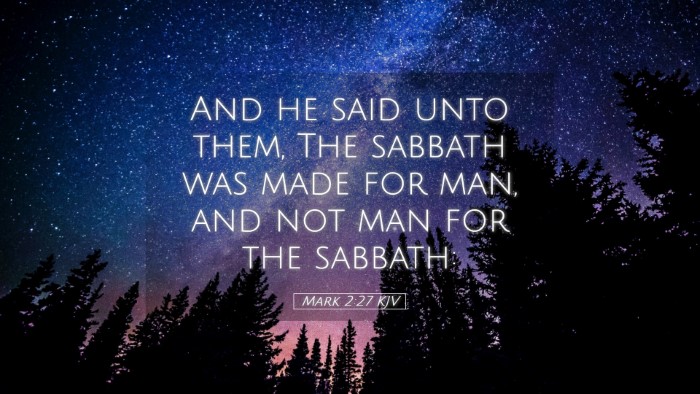Old Testament
Genesis Exodus Leviticus Numbers Deuteronomy Joshua Judges Ruth 1 Samuel 2 Samuel 1 Kings 2 Kings 1 Chronicles 2 Chronicles Ezra Nehemiah Esther Job Psalms Proverbs Ecclesiastes Song of Solomon Isaiah Jeremiah Lamentations Ezekiel Daniel Hosea Joel Amos Obadiah Jonah Micah Nahum Habakkuk Zephaniah Haggai Zechariah MalachiMark 2:27
Mark 2:27 KJV
And he said unto them, The sabbath was made for man, and not man for the sabbath:
Mark 2:27 Bible Commentary
Commentary on Mark 2:27
Verse: “And he said unto them, The sabbath was made for man, and not man for the sabbath.”
Introduction
Mark 2:27 stands as a pivotal statement concerning the purpose of the Sabbath in the Christian understanding of law and grace. This declaration by Jesus encapsulates essential teachings concerning humanity's relationship to divine law. Below, we explore insights from renowned biblical commentators, reflecting on the implications and applications of this verse for believers today.
Insights from Matthew Henry
Human Benefit and Divine Intent: Matthew Henry emphasizes that the Sabbath was instituted for human benefit, to provide rest and spiritual rejuvenation. Rather than being a burden, the Sabbath serves as a gift from God, aligning with man's need for physical rest and spiritual contemplation.
Creation Order: He points to the creation narrative, noting that God established the Sabbath after the creation of man. This indicates that the Sabbath is meant to enhance human life rather than restrict it. Henry writes, “God’s designs in the command was for man’s good.”
Reflections from Albert Barnes
Sabbath and Humanity: Albert Barnes offers a deeper insight into how the religious leaders of Jesus' time had misconstrued the purpose of the Sabbath. He explains that their rigorous legalism overshadowed the fundamental intention of the law, which is to promote life, mercy, and kindness.
Christ’s Authority: Barnes underscores the authority of Christ in interpreting the law, highlighting that His correction of the Pharisees’ understanding of the Sabbath is a clear statement about the heart of God's law. He posits that the true spirit of the law seeks the welfare of mankind.
Understanding from Adam Clarke
Legalism vs. Liberty: Adam Clarke's commentary elaborates on the tension between the legalistic practices imposed by the Pharisees and the liberating intent of Christ’s teaching. He notes that the Sabbath should be a day of joy and restoration, promoting well-being rather than mere observance of rules.
Christian Application: Clarke advocates for balance in Sabbath observance that prioritizes mercy, compassion, and human need, aligning with Jesus' own practice of healing on the Sabbath, thereby illustrating God's love for humanity.
Theological Implications
- Sabbath as a Gift: The commentators collectively highlight that the Sabbath is a divine blessing intended for the enrichment of human life. It serves as a reminder of humanity's dependence on God.
- Restoration over Ritual: The emphasis should be on restoration — physical, emotional, and spiritual — rather than strict adherence to rituals that neglect the essence of grace and mercy.
- Christ's Lordship: Jesus' declaration asserts His lordship even over the Sabbath, introducing a new understanding that is grounded in love and practicality, which calls for a re-evaluation of religious practices in light of true discipleship.
Practical Applications for Today’s Believers
Redefining Sabbath Observance: Modern believers are encouraged to approach the Sabbath not as a mere obligation but as an opportunity for spiritual renewal and community engagement. How one observes the Sabbath can serve as a reflection of God’s grace in their life.
Emphasis on Mercy: As Jesus emphasized, the true spirit of the Sabbath is tied to acts of mercy and goodness. It challenges believers to seek ways to serve others, particularly in their community, especially on days dedicated to worship.
Personal Reflection: Christians are invited to assess their personal practices on the Sabbath. Are they opportunities for growth, service, and love, or have they become routine rituals that lack heart? Embracing the Sabbath as a time for connection with God and others can lead to deeper spiritual and communal bonds.
Conclusion
Mark 2:27 encapsulates profound truths about the relationship between man and God’s law. Through the insights of Matthew Henry, Albert Barnes, and Adam Clarke, we see a clarion call to embrace the Sabbath as an instrument of grace. It shifts the focus from mere compliance to the deeper understanding of God’s heart — one that seeks to uplift, restore, and nurture humanity. Pastors, students, theologians, and Bible scholars are thus challenged to reaffirm the significance of the Sabbath in the contemporary Christian experience, reiterating its purpose as a divine gift for the well-being of mankind.


